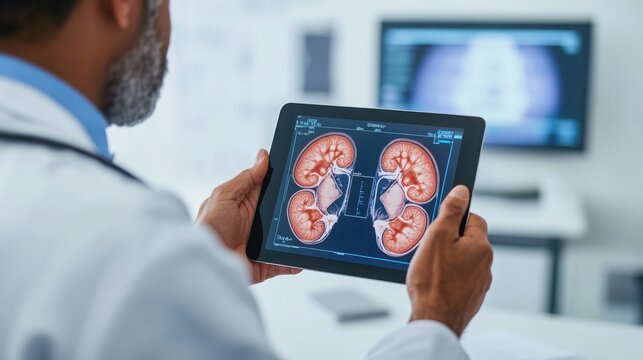
Kidney-Health
Kidneys are small but powerful organs that silently manage several essential functions in the body. They filter waste, balance fluids, regulate blood pressure, and even help produce red blood cells. Unfortunately, kidney problems often go unnoticed until they have progressed significantly. Many people dismiss early symptoms, thinking they are minor or unrelated. Recognizing the hidden signs of kidney issues is crucial for timely diagnosis and treatment. Below are ten lesser-known indicators that your kidneys may not be working as well as they should.
1. Persistent Fatigue and Weakness
When kidneys fail to function properly, they produce less of a hormone called erythropoietin, which stimulates the production of red blood cells. A shortage of red blood cells can lead to anemia, causing you to feel unusually tired, weak, or mentally drained. If fatigue lingers even after rest, it could point toward kidney-related complications.
2. Changes in Urination Patterns
The kidneys are directly responsible for producing urine, so any noticeable changes in urination can be a red flag. Watch out for symptoms like:
- Frequent urination at night (nocturia)
- Foamy or bubbly urine (indicating protein leakage)
- Blood in the urine (hematuria)
- Decreased or unusually small amounts of urine
Such variations should not be ignored and warrant medical attention.
3. Swelling in Hands, Feet, and Ankles
Kidneys regulate the balance of fluids and sodium in the body. When they are not functioning effectively, excess fluid builds up, leading to swelling (edema). This swelling is most visible in the ankles, feet, legs, and sometimes even around the eyes. Unlike normal swelling from long periods of standing, kidney-related edema tends to persist.
4. Unexplained Itching and Dry Skin
Healthy kidneys remove waste and maintain the right balance of minerals in the body. When kidney function declines, waste products accumulate in the blood, leading to itchy or dry skin. Persistent itching without a clear dermatological cause can be an overlooked indicator of chronic kidney disease.
5. Puffiness Around the Eyes
Puffy eyes, particularly in the morning, may signal protein leakage in the urine. Normally, protein helps the body build muscles and repair tissues. But when the kidneys cannot filter blood properly, protein passes into the urine instead. This loss of protein can manifest as swelling or puffiness around the eyes, even if other symptoms are not yet visible.
6. Shortness of Breath
Kidney disease often causes fluid retention, which can accumulate in the lungs and make breathing difficult. Additionally, anemia associated with kidney problems reduces oxygen delivery to tissues, further contributing to breathlessness. If you experience shortness of breath without an obvious cause, such as asthma or heart disease, it could be linked to your kidneys.
7. Poor Concentration and Dizziness
Kidneys play a vital role in ensuring that the blood carries enough oxygen and nutrients to the brain. When anemia develops due to kidney disease, you may experience difficulty concentrating, dizziness, or even memory problems. These cognitive issues are often subtle and may go unnoticed until they worsen over time.
8. Metallic Taste and Bad Breath
A buildup of waste in the blood, a condition known as uremia, can affect how food tastes and cause bad breath. Many people with kidney problems complain of a metallic taste in their mouth, leading to reduced appetite or unintentional weight loss. This symptom often appears in more advanced stages of kidney disease.
9. Muscle Cramps and Restlessness
Kidneys regulate electrolytes such as calcium, potassium, and phosphorus. When these minerals fall out of balance, muscle cramps, twitches, or restless legs may occur. While occasional cramps can result from dehydration or exercise, frequent or severe cramps without clear reasons may point to impaired kidney function.
10. Nausea and Digestive Issues
Digestive problems like nausea, vomiting, or loss of appetite can arise when toxins accumulate in the bloodstream due to poor kidney filtration. Some people also experience a constant upset stomach or an aversion to protein-rich foods. Since these symptoms overlap with many other conditions, they are often overlooked until kidney function is tested.
Why Early Detection Matters
Kidney problems are often called “silent killers” because they can progress quietly without showing clear signs until the damage is advanced. By the time symptoms become severe, treatment options may be limited, and dialysis or transplantation could become necessary. Recognizing subtle indicators early gives patients the chance to seek medical help, manage underlying causes like diabetes or hypertension, and protect remaining kidney function.
When to See a Doctor
If you notice one or more of these hidden signs persisting, it’s important to consult a healthcare professional. Simple blood tests (such as creatinine and blood urea nitrogen) and urine tests can provide critical insights into kidney health. Doctors may also recommend imaging or biopsy in certain cases to determine the extent of damage.
Check your kidney health with a Uric Acid Spot Urine test
Conclusion
The kidneys are vital organs that deserve more attention than they typically receive. The hidden signs of kidney problems, such as fatigue, swelling, unexplained itching, or changes in urination, are the body’s way of signaling that something is wrong. Paying attention to these early warning signs can significantly impact prevention and treatment outcomes. If you or a loved one experiences these symptoms, don’t dismiss them as minor issues. Timely medical advice can help preserve kidney function and ensure long-term health.




